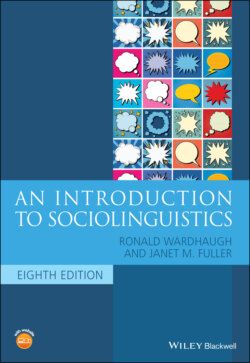Читать книгу An Introduction to Sociolinguistics - Ronald Wardhaugh, Janet M. Fuller - Страница 42
Standardization
ОглавлениеOne of the defining characteristics mentioned above about the distinction between ‘dialect’ and ‘language’ has to do with standardization. If you see yourself as a speaker of German, you orient to Standard German, not Standard Dutch, even if Standard Dutch might be linguistically more similar to your native dialect. Thus the process of standardization and the ideology involved in the recognition of a standard are key aspects of how we tend to think of language and languages in general. People tend to think of a language as a legitimate and fixed system which can be objectively described and regard dialects as deviations from this norm. This is the standard language ideology but, as we will see, it is only one way that we can think about a language and its varieties.
Standardization refers to the process by which a language has been codified in some way. That process usually involves the development of such things as grammars, spelling books, and dictionaries, and possibly literature (see chapter 13 for further discussion of language planning processes). We can often associate specific items or events with standardization, for example, Wycliffe’s and Luther’s translations of the Bible into English and German, respectively, Caxton’s establishment of printing in England, and Dr. Johnson’s dictionary of English published in 1755. Standardization requires that a measure of agreement be achieved about what is considered standard language and what is not.
